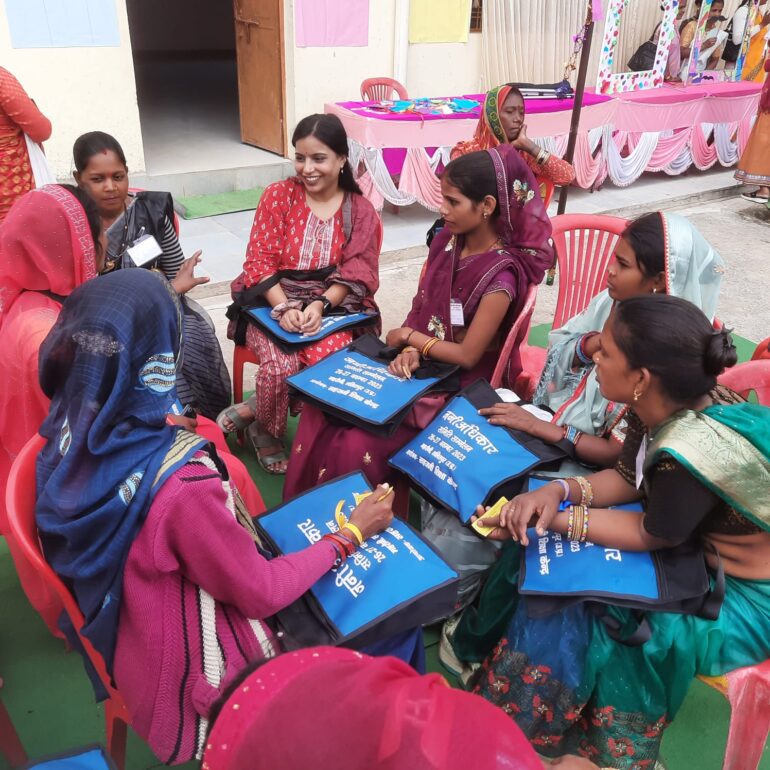Systemic violence against survivors of gender-based violence is worse than interpersonal violence
By Mathangi Swaminathan
“Getting justice in India can lead to a lot of injustice,” said Ranjita, founder of Samarthya, an Indigenous women-led organization in India advocating against gender-based violence.
In the week of World Population Day, which marks 2023 as the year to “unleash the power of gender equality,” India lags far behind in access to basic justice. Ten Dalit women and girls are raped every day, and nearly 50 percent of women face intimate partner violence. This violence is traumatizing, but the systemic violence against survivors, particularly those from marginalized communities, is brutal, often undiscussed, and a massive human rights violation.
This needs to change.
After 200+ hours of interviews with live experts fighting against gender-based violence at Parity Lab, we found a three-fold level of staggering systemic violence, especially for women from marginalized communities.
Firstly, survivors and their advocates face extreme hostility from the police when trying to register their complaints. A 2019 report by J-PAL found that “39 percent of officers in India believe that GBV [gender-based violence] complaints are generally unfounded.” A 2020 article quotes a policewoman, “In my point of view, 70 percent of the [gender violence] cases are lies. The truth is something else.”
“A woman once approached us with bleeding veins,” Ranjita said. “We accompanied her to the police station to file a complaint, and the cops told us to step aside so they could talk to her alone. They tried to dissuade her from filing the report and sent us around to different police stations. When she still wanted to report, they accused us of coercing her… Now, they tell us that since she comes from the neighboring state of Karnataka, this case is out of their jurisdiction. These are the challenges we face with the justice system.”
The trauma of partner violence grows when victims are mocked by the authorities who are supposed to protect them. Women from marginalized communities, with few resources to fall back on, are shamed, shunned, and gaslighted until they have no option but to go back to the violence they tried to escape.
It is no wonder that 77% of women in India do not tell anyone, even their closest relatives, about the violence they experienced. Women seek justice only when the situation becomes impossible to survive.
Secondly, on the rare occasions that a woman successfully gets a complaint registered, the legal system becomes a decades-long process, making it impossible for women with pre-existing barriers to literacy, transport, and finance.
The bureaucracy of legal procedures leaves survivors financially, emotionally, and physically drained. The legal pathway requires such monumental effort from survivors that many prefer the violence they are already facing to violence from the judicial process.
“They are intent on breaking the survivors’ will to seek justice,” said Ranjita.
India has a backlog of 40 million court cases, which impacts survivors of gender-based violence. It is no wonder that women shy away from accessing justice. Why would they, if it ends up costing them several years of their lives, along with their dignity and respect?
Thirdly, this is all compounded by societal pressures to preserve the family structure at any cost. In Bundelkhand, India, a region infamous for crimes against women, the word “compromise” has taken a dark turn. In hundreds of violent cases in the region, sexual assault or even murder are ‘settled’ between families through the exchange of money or other goods. In such cases, the survivor’s story is forever erased.
The intense stigma, shame, and pressure to “preserve” families compounded by a hostile justice system forces families to, once again, make survivors feel powerless, alienated, and worthless.
“How can compromise be justice if the woman is raped or is no longer with us?” asked Meena Devi, founder of Sahjani Shiksha Kendra, a Dalit women-led organization fighting against gender-based violence in Bundelkhand.
For the more than 70 percent of Dalit women in Bundelkhand who are not afforded the luxury of formal education, live in rural areas, suffer from extreme caste oppression, and are not financially independent, no one is on their side: not the police, the judicial system, not even their own families.
Such extreme violence is hard to digest. “It affects a case worker’s mind,” said Meena Devi. “Sometimes the brain stops working, one does not sleep at night and remembers the woman for months. Sometimes, the same things appear in dreams.”
Creating survivor-centric systems is urgent. Creating fast-track courts for the millions of survivors of gender-based violence and gender-sensitive training for police are simple and effective measures to create change for the decades to come.
It takes extraordinary courage for women to seek justice. When they do, it is the duty of the system to ensure justice.
Let us treat such violence like the crisis it is. Women in rural India deserve to be safe.
Mathangi Swaminathan is the founder of Parity Lab, a first-of-its-kind accelerator for survivors-turned-entrepreneurs fighting against gender-based violence. She is an Echoing Green Fellow, an Acumen India Fellow, a World Economic Forum Global Shaper, and an alumna of the Harvard Kennedy School.

